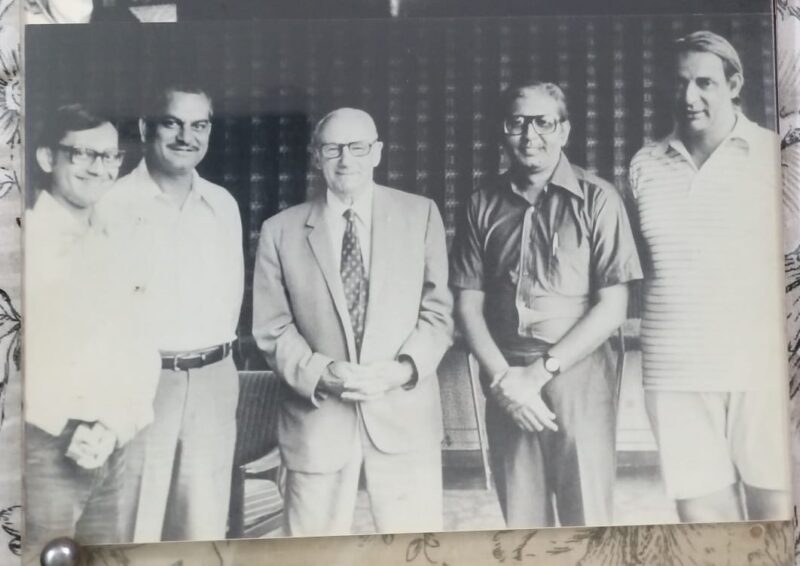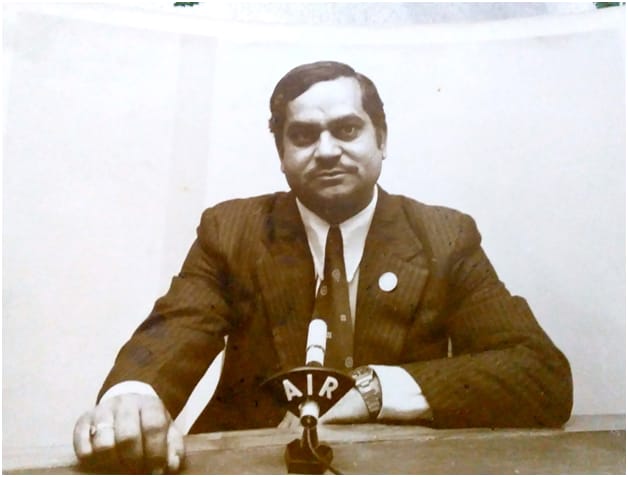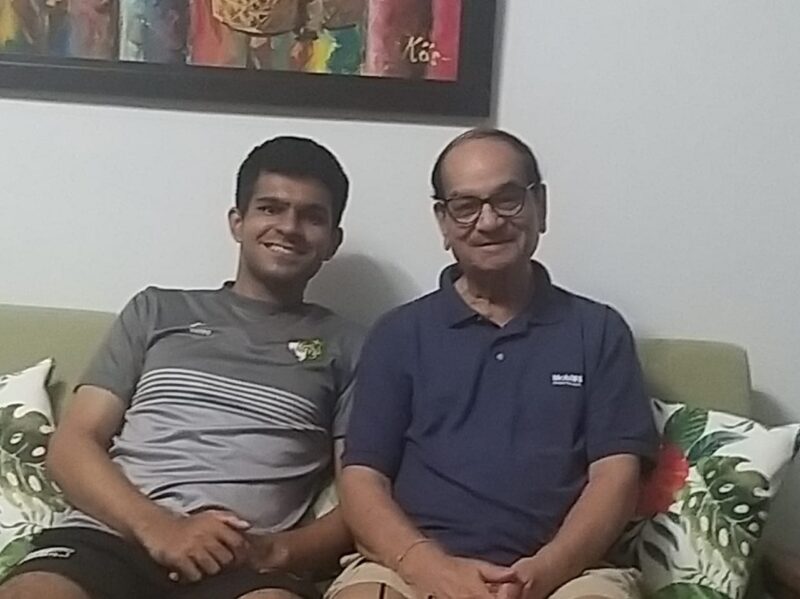Former cricket commentator Ravi Chaturvedi, an ex-professor of Zoology in Delhi University’s Zakir Husain College, has cricket embedded in his life.
So much so that after covering the sport for over four decades for Prasar Bharati, pioneering and establishing Hindi commentary as a genre even while also teaching, he decided to get a PhD in the sport after retirement, eventually earning it at the age of 83.
Having completed the thesis in 2015 when he was 78, the Padma Shri had to work his socks off over the next four years to finally earn it in 2020 since universities wouldn’t take a Zoology professor writing PhD thesis on cricket seriously.
“It is just passion. I don’t have to look for any job or teach anywhere now. But I just wanted to complete a PhD in cricket,” says Chaturvedi, now 85, who remains fit and lively, even doing household chores like fetching groceries by himself.
The octogenarian got involved in cricket when, at the age of eight, he shifted to Delhi from his native Kanpur in 1945.

“My brother got a job with horticulture department, first in Lucknow, then in Delhi. We descended on Mall Road (north Delhi) from Kanpur. His office was in old secretariat and his bungalow was at Mall Road. This was pre-independence and there were English officers too. They would practice every evening and play every Saturday and Sunday.”
As a kid, Chaturvedi would go to witness the British officers play cricket.
“For a kid of 7-8, who came from a small town, that was a very enchanting scene. I used to go and watch the game. Across the small street was the university ground, where you could see inter-college cricket from October to January-end. The quality was high,” added Chaturvedi.
He took to cricket, playing for NAV Middle School, Timarpur, then for Government School in Lodhi Road from where he emerged with first division – he was the only one in his class to earn that.
“After clearing school in 1953, I cycled down to Deshbandhu College but it was under construction and I didn’t like the look of it. Then I consulted others, with whom I used to play cricket, for pre-medical education (post 10th standard). Most suggested Delhi College.”
The next day he cycled down to the college at Ajmeri Gate. It was an old structure and the sight of it initially unnerved him. “I looked around the medieval structure with a mosque. It had been vandalised during partition. I thought I am a Brahmin from Kanpur, will I be accepted? I had fear. I went in, submitted my marksheet, was asked to fill a form and to my surprise, the principal Mirza Mehmood Begg, a respected figure in Delhi, admitted me immediately and gave me plenty of time to submit my fees as my father was away. He was so polite.”
Delhi College stayed with him for the rest of his life. He did his pre-medical from there, and B.Sc. (Hons) and M.Sc. from the university campus as a Delhi College student.

That he wasn’t able to pursue medicine can be blamed on his love for cricket, he himself admits.
“I used to play cricket [for college and City Gymkhana club]. Where would the marks come from? Got only second division.”
Even in college, the passion for cricket didn’t leave him. So much so that when he was selected to be trained under the Rajkumari Amrit Kaur coaching scheme and pursued it, he was ticked off by college.
“I missed practicals for three days (practical classes would be held between 2.30 pm and 5 pm). I missed them for cricket coaching. On the fourth morning, I was summoned by HoD, ML Bhatia. He asked me, ‘where were you for three days?’ I told him proudly about cricket coaching. He didn’t even know anything about ex-India star Col CK Nayudu, who was conducting it. He chided me and said, ‘Either you study Zoology or you play cricket’.”
The studies in hard sciences were intense back then, Chaturvedi reveals.
“After that, I evaluated myself and said to myself, ‘See, I don’t have that much potential that I can become a Test cricketer’. At that time, impression counted a lot especially in sciences. You would spend the whole day there. From 9 am to 5 pm. The studies were intense. Even on Diwali day, we had to be in the lab till 2 pm.”
But cricket as an opening batsman continued at inter-college and club levels. In M.Sc. (previous), he was invited by Ramjas College to join on the basis of cricket. But he refused and stayed loyal to Delhi College, where he would join as a lecturer in Zoology in early 1960s following a two-year stint in fisheries department during which he also developed a fish farm in Barwala village in North West Delhi.
But it was in 1960-61 that he joined for what he became most known for.
He had applied for commentator’s job in All India Radio (AIR) when an opening came his way.
“I got a letter stating that I’ve cleared my audition for English cricket commentary. There was a gentleman by the name of RN Das, an assistant director. He said, ‘you are young. We have big names commentating — Maharaja of Vizianagram among others. You won’t get an opportunity for the next 10 years. An occasional Ranji game, yes. But Test matches wouldn’t be possible’.”
Das apprised him of an opportunity in Hindi commentary, where AIR wasn’t able to find anyone.
“I was disappointed. I consulted a neighbour who worked in AIR and he said, ‘Hindi is the future. Grab it’.”
Thus began the journey, starting with India’s 1961 Test against Ted Dexter’s England and lasting over 40 years with the national broadcaster – AIR till 1978-79 and Doordarshan television after that. It gave him opportunity to cover around 150 matches.
“It allowed me to meet top cricket stars. Top former cricketers remain my friends till this day.”
Establishing Hindi commentary was tough since unlike English commentary, there was no example beforehand. It was learning on the job.
Chaturvedi also continued teaching at the Delhi College (renamed as Zakir Husain College in 1975).
“I had heard John Arlott and Alan McGilvary and knew about the essential components of cricket commentary. I made it a point that Hindi commentary should not be a subject of ridicule. I was aware of the mockery of some translated words like kantth langot for tie and Loh Path Gamini for train. So, I decided to use technical words of the game verbatim like slip, gully, bowler, cut, pull, legbreak, googly, innings, ball and bat among others,” he says before talking about his inspiration.
“I am influenced by the poem ‘A Psalm of Life’ by HW Longfellow, especially the line, ‘And, departing, leave behind us, Footprints on the sands of time’. I have tried to contribute something lasting wherever I have gone. Be it setting up a fish farm while working in fisheries department, establishing Hindi commentary, and setting up the Zoology museum in Zakir Husain College, a first in Delhi University (DU). It was Prof. ML Bhatia’s dream to set up a Zoology museum in DU campus but he couldn’t.”
The PhD in cricket was also tough.
He opted for Kanpur as things weren’t moving in DU, especially with regards to exemption on mandatory coursework. He was promised cooperation by the then vice-chancellor, Ashok Kumar.
But two months before he went to submit his thesis, Kumar had moved to Gorakhpur from Kanpur.
“The new V-C and those close to him refused to entertain my thesis saying that since I taught Zoology and was qualified in in that only, a PhD in cricket won’t be possible. I insisted citing my experience of covering cricket and as a teacher. Things went back and forth for four years. Once the new V-C was out of the university, I pursued it again and eventually earned it.”
But what was the need for PhD in cricket, having already covered so much of international cricket.

“I am a bit mad, my brain works weird at times. It is just my interest,” says the man who is nowadays keeping a keen eye on his grandson (daughter’s son), Aahan Gopinath, who is representing associate nation Singapore in international cricket.
He also spends time working for his village of birth, Dalip Nagar in Kanpur, where his efforts brought electricty in 1986 and repair and cleaning of irrigation canal twice, in 2010 and 2022.





